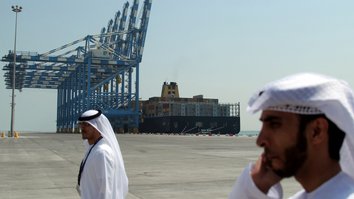The leaders of France, Germany and Britain on Monday (September 23) agreed that the Iranian regime carried out this month's attack on Saudi Arabian oil infrastructure and called on Tehran to choose dialogue over further "provocation".
French President Emmanuel Macron, German Chancellor Angela Merkel and British Prime Minister Boris Johnson backed the conclusion of the United States on the blasts at the Abqaiq and Khurais facilities.
"It is clear for us that Iran bears responsibility for this attack. There is no other explanation," they said in a joint statement released by France after meeting on the sidelines of the United Nations General Assembly.
But the solution is diplomacy, said the three countries.
![Iranian military officers meet to discuss the 'latest military achievements' in April. [DEFAPress]](/cnmi_pf/images/2019/09/24/20103-iranianmilitary-585_329.jpg)
Iranian military officers meet to discuss the 'latest military achievements' in April. [DEFAPress]
"We call on Iran to commit to such a dialogue and to avoid any new provocation and escalation," they said.
"The attacks also highlight the need for a de-escalation in the region, for sustained diplomatic efforts and engagement with all sides," they added.
Tensions in the Gulf region have been steadily mounting following a series of increasingly serious incidents, including when armed attack boats believed to belong to the Iranian regime's Islamic Revolutionary Guard Corps (IRGC) attempted to seize a British tanker in July.
Days later the US Navy destroyed an Iranian drone after it threatened an American naval vessel at the entrance of the Strait of Hormuz.
Extensive damage
Saudi Arabia on September 20 revealed extensive damage from the strikes on state oil giant Aramco's facilities in Khurais and the world's largest oil processing facility at Abqaiq.
The September 14 attacks, which knocked out half of Saudi Arabia's oil production, have been claimed by the Tehran-backed Houthi rebels in Yemen, while Washington has pointed its finger at Tehran, condemning the strikes as an "act of war".
Abqaiq was struck 18 times, while nearby Khurais was hit four times in a raid that triggered multiple explosions and towering flames that took hours to extinguish, Aramco officials said.
Aramco flew dozens of international journalists to the two sites to show it was speeding up repairs, giving rare access to the nerve centre of the world's largest oil producer.
More sanctions
The United States already maintains sweeping sanctions on Tehran including on its central bank, but the new sanctions on September 20 were imposed for the additional reason of "terrorism". The Central Bank of Iran has provided "billions of dollars" to two groups blacklisted by the United States, said the US government.
The "Treasury's action targets a crucial funding mechanism that the Iranian regime uses to support its terrorist network, including the Quds Force, Hizbullah and other militants that spread terror and destabilise the region," said US Treasury Secretary Steven Mnuchin.
The Quds Force conducts international operations for the IRGC, while Hizbullah, the Shia militant group and political party in Lebanon, is among Iran's closest regional partners.
On September 10, the United States expanded the powers of its officials and agencies to target leaders of terrorist groups and individuals and entities that financially support them around the world.
A newly signed executive order "allows the US government to more efficiently target leaders or officials of terrorist groups as well as individuals who participate in terrorist training", according to a US Treasury Department statement.

![A destroyed installation in Saudi Arabia's Abqaiq oil processing plant is pictured on September 20. [Fayez Nureldine/AFP]](/cnmi_pf/images/2019/09/24/20102-saudioil-585_329.jpg)







Well! That's the reality. Everyone knew that Houtis militia could not acquire such advanced missile technology through their sources in the region. Frustrated as Iran was after crippling sanctions, she has no choice to exteriorize its anger and grievances on its arch enemy Saudi Arabia. Committing such an insensible act, the iranian regime has caused and called for sanctions.
Reply2 Comment(s)
Westren & american destroing muslim countries one by one now they salect iran for destruction
Reply2 Comment(s)